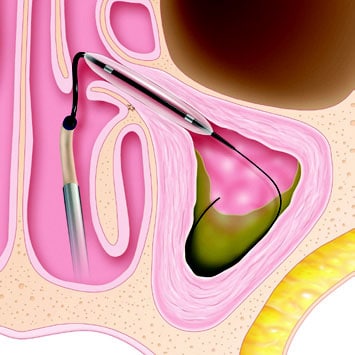If you suffer from chronic sinusitis and have run out of options, you may be a candidate for balloon sinuplasty. This minimally invasive surgery is a safe and effective method of enlarging your sinus passages for easier breathing and a drastic reduction in sinusitis symptoms.
What Is Sinusitis?
Recurrent acute sinusitis and chronic sinusitis affects around 30 million Americans each year. These infections occur when the sinus opening becomes blocked, decreasing airflow and preventing mucus from draining properly. They cause cold-like symptoms that include congestion, runny nose, sore throat, facial pain and swelling, pain in the upper teeth, loss of smell or taste, bad breath, fatigue and headache.
Viral infections most often cause these conditions, though they can also occur due to nasal polyps, a deviated septum or head trauma. Medical treatment and allergy shots work for some, but others continue to suffer despite numerous attempts using various treatments. Balloon sinuplasty may be the answer.
What’s Different About Balloon Sinuplasty?

Conventional sinus surgical procedures involve cutting and excision of bone and tissue. Dissolvable packing often helps control bleeding. The average recovery period is about five days long. Balloon sinuplasty dilates (widens) the openings of your natural sinus openings without removing tissue. For that reason, it causes less pain and has a much shorter average recovery period of only about a day and a half. It rarely requires packing.
Balloon sinuplasty can be performed in the office quickly (the actual operating time is often under 30 minutes) and has a lower risk of complications or side effects. It is FDA-approved and considered a safe alternative to endoscopic sinus surgery.
How Is Balloon Sinuplasty Performed?
Balloon sinuplasty is typically performed in an outpatient setting. You’ll usually be given an oral sedative and a local anesthetic to help keep you comfortable while your ENT surgeon uses an endoscope to help guide the balloon catheter into your sinuses. The balloon is then inflated to enlarge the sinus opening and widen the walls of the nasal passages. The goal is to enlarge your sinus opening to improve drainage and airflow permanently.
During the surgery, a saline solution is often sprayed into the sinuses to flush out mucus and other debris; the catheter is then removed. Up to 95% of patients report a significant improvement in sinus symptoms following this procedure.
If you are interested in balloon sinuplasty, speak with your doctor.